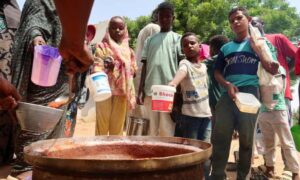
Sudan had the world’s largest number of people facing extreme food shortages in 2023 as conflict and displacement drove food insecurity globally, according to the UN’s Food and Agriculture Organisation (FAO).
The war between rival generals meant Sudan accounted for two-thirds of the additional 13.5 million people needing urgent help last year, while conflict also plunged Gaza into the world’s most severe food crisis with its entire population facing high levels of food insecurity.
Globally, more than 281 million people in 59 countries faced high levels of acute food insecurity according to the Global Report on Food Crises, published today, with economic crises and extreme weather also contributing.
Despite the scale of Sudan’s hunger crisis, with 20.3 million in the country facing acute food insecurity, the FAO warned of underfunding. Rein Paulsen, its emergencies director, said it was crucial to get more financing for emergency agriculture to ensure Sudanese farmers can produce food during the upcoming planting season.
“The risk of famine is here, the risk of famine is real, but there is a window of opportunity to act,” said Paulsen. “Farmers need to be preparing their land now already, in April, seeds have to get in the ground in June. One thing is clear – if we have a main cereal cropping season that is compromised or that is not successful, we know that there is going to be a much worse situation coming in the months ahead.”
Paulsen said more funding and ensuring farmers could access their land was crucial to avoiding famine. He added that while food aid provided directly to people was still urgently needed, supporting locally produced food would be most cost-efficient and sustainable.
The FAO report said the conflict had restricted access to farmland and movement for livestock, as well as destroying infrastructure, leading to disruption of the production of key grains such as sorghum and millet, forcing Sudan to rely heavily on imported food.
Paulsen said food production fell 46% last year and hunger was worst in areas where the conflict was most intense, such as Darfur and Al Jazirah, which is often considered Sudan’s bread basket.
